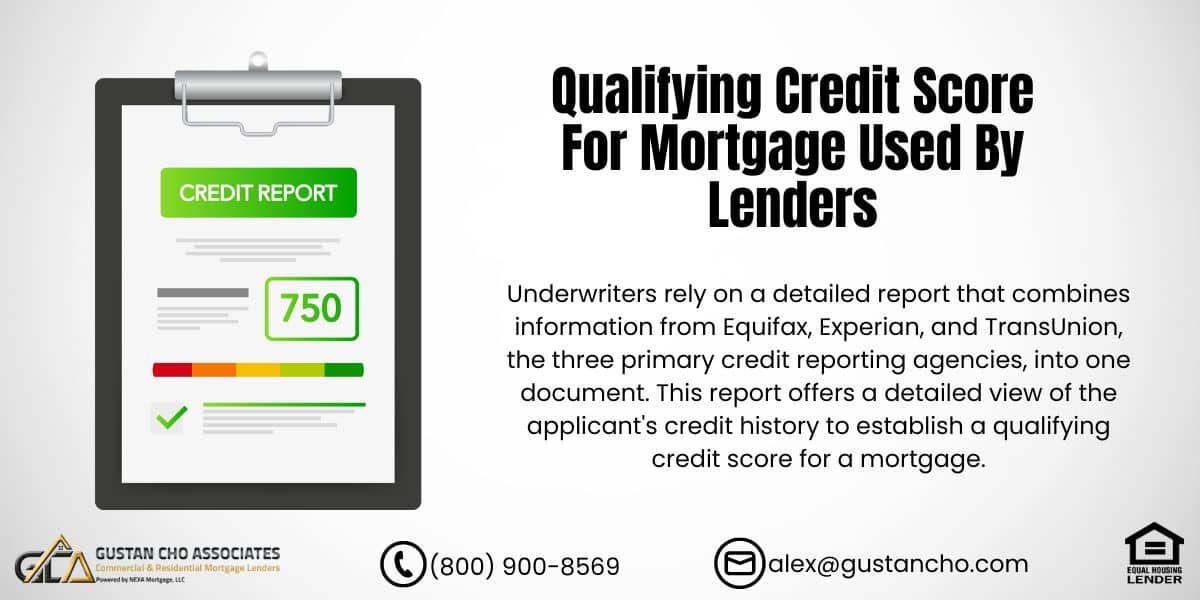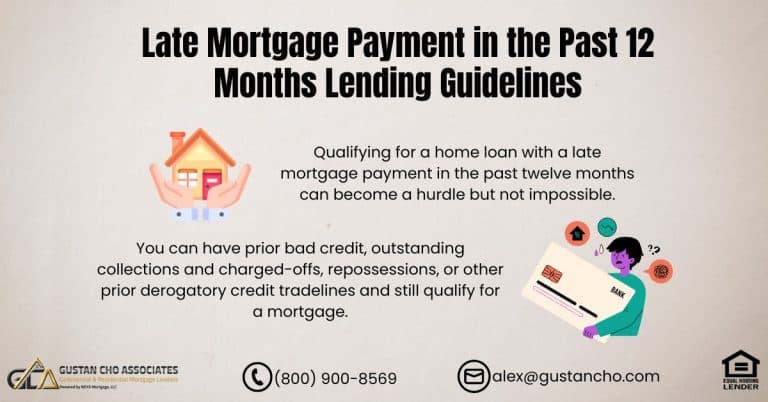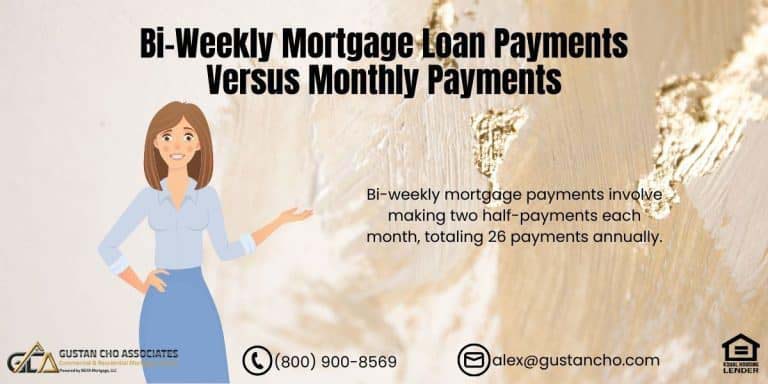In this blog, we’ll explain the qualifying credit score that lenders use for mortgages. Mortgage underwriters determine this score by selecting the middle credit score from a tri-merge credit report. When a mortgage applicant applies, the loan officer pulls a report to evaluate creditworthiness. Not all creditors rely on tri-merge credit reports.
It is common for auto finance companies, credit card issuers, student loan providers, and personal loan creditors to obtain credit reports from only one of the three major credit bureaus.
This means they only sometimes access credit reports from all three bureaus. Lenders typically use one of the three major credit bureaus for credit reports. However, because the average mortgage amount approaches $300,000 and the mortgage process is complex, mortgage companies need a tri-merge credit report instead of a single-bureau report. All mortgage lenders use tri-merge credit reports and consider the middle credit score when determining the qualifying credit score for mortgage applicants.
What Is Tri-Merger Credit Report?
A tri-merge credit report also called a 3-bureau credit report or Residential Mortgage Credit Report (RMCR), is used by all mortgage companies to determine the qualifying credit score for mortgage applicants.
Underwriters rely on a detailed report that combines information from Equifax, Experian, and TransUnion, the three primary credit reporting agencies, into one document. This report offers a detailed view of the applicant’s credit history to establish a qualifying credit score for mortgage.
Wondering If Your Credit Score Qualifies for a Mortgage? Let Us Help You Find Out!
Contact us today to find out if your credit score qualifies and start your mortgage application.
Do You Need Credit Score for a Mortgage?
A credit score is crucial when applying for a mortgage because lenders rely on it to evaluate an applicant’s creditworthiness and the likelihood of loan repayment. Here’s how your qualifying credit score for mortgage affects your application:
- Qualification: Lenders typically require a minimum credit score depending on the type of mortgage. For instance, a conventional loan generally requires a score of at least 620. In contrast, FHA loans can accept scores as low as 500 with more stringent conditions.
- Interest Rates: Higher credit scores often enable borrowers to secure more favorable interest rates, reducing the overall mortgage cost.
- Down Payment: Individuals with lower credit scores may be required to provide a higher down payment when applying.
- Loan Types: Some loans, such as VA and USDA, may be more lenient in their credit score requirements, but lenders will still evaluate the overall credit profile.
Although obtaining a mortgage without a traditional credit score is possible by providing proof of alternative forms of credit (like rental history or utility bills), this option is less common and often requires specialized lenders.
What Is The Qualifying Credit Score For Mortgage Used By Lenders?
When lenders check a mortgage applicant’s credit report, they obtain a tri-merge report that pulls data from all three credit bureaus. As a result, mortgage loan applicants have three credit inquiries when a tri-merge credit report is pulled.
Lenders use credit scoring models provided by FICO® and VantageScore to determine creditworthiness. The version of FICO® Score 8 is commonly used by lenders to make decisions about loans, particularly for credit scores that qualify for mortgages.
In contrast to other credit types like credit cards, where only one credit bureau is checked, mortgage applicants have a tri-merge credit report pulled by lenders. This applies to borrowers with co-borrowers or non-occupant co-borrowers, ensuring a comprehensive view to determine the qualifying credit score for mortgage.
Qualifying Credit Score Determined By Lenders
The qualifying credit score for a mortgage serves two main purposes:
- Meeting Minimum Credit Score Requirements: It helps lenders determine if the applicant meets the minimum credit score criteria set for the loan.
- Determining Mortgage Rates: Lenders can establish the appropriate interest rates based on the applicant’s credit risk.
When lenders obtain a tri-merge credit report, they receive credit scores from all three major bureaus. Each bureau provides a unique score, and instead of averaging them, lenders choose the middle score as the qualifying credit score. This middle score is crucial in assessing the borrower’s eligibility and determining mortgage terms.
Which Credit Score do Mortgage Lenders Use?
When a primary borrower has a co-borrower or multiple non-occupant co-borrowers, lenders will consider the lowest middle credit score among all co-borrowers and non-occupant co-borrowers as the qualifying credit score for mortgage.
As for co-signers, they stand in the primary applicant’s place during the loan approval process. A co-signer generally needs a minimum median credit score of 580 for FHA or VA loans. Gustan Cho Associates requires a qualifying credit score of 500 FICO for conventional loans for both FHA and VA loans.
It’s worth noting that many consumers checking their scores through Credit Karma or other third-party services often have scores that differ significantly from the mortgage credit scores used by lenders. The credit scores that lenders rely on are specifically tailored as mortgage credit scores.
Are Mortgage Credit Scores More Accurate Than Credit Karma?
Mortgage credit scores are designed with specialized algorithms that assess the risk factors of borrowers seeking a new home mortgage, ensuring their ability to repay the loan.
Consumer credit scores, such as those provided by Credit Karma and other third-party credit monitoring services, can differ significantly from the qualifying credit scores for mortgage.
How Credit Scores Work During Mortgage Process
Many consumers often need clarification on having three different credit scores. At Gustan Cho Associates, we frequently receive questions from clients and viewers seeking clarification on why this happens. In the United States, there are three primary credit bureaus:
- TransUnion
- Experian
- Equifax
Each bureau employs its own method for calculating a consumer’s credit score. Thus, each consumer will have varying credit scores across the three bureaus due to their distinct scoring algorithms.
Mortgage lenders evaluate the middle score among these three to establish the qualifying credit score for mortgage applicants. For instance, if Experian provides the middle score of the three, the lender will use this Experian score to determine eligibility. This qualifying credit score for a mortgage is used consistently throughout the mortgage application process until closing and remains valid for 120 days.
Not Sure If Your Credit Score Qualifies for a Mortgage? We Can Help You!
Let us guide you through the process of checking your credit score and understanding its impact on your mortgage approval. Contact us now to get started.
Qualifying Credit Score For Mortgage: Case Scenario
Let’s look at an example to understand how lenders establish a qualifying credit score for mortgage applicants:
TransUnion: 600
Experian: 650
Equifax: 700
The middle score 650 is selected as the qualifying credit score for mortgage. While some commercial lenders might prefer to rely on a particular credit bureau, such as Equifax, using that specific score as the qualifying credit score, others, like auto lenders or credit card companies, might exclusively rely on TransUnion. Ultimately, each creditor determines which credit score source best suits their credit evaluation criteria.
Qualifying Credit Scores If The Borrower Has Co-Borrowers
When the primary borrower has co-borrowers, Fannie Mae permits the middle credit scores of both the borrower and co-borrowers to be averaged. For instance, if the borrower has a 600 FICO score and the co-borrower has a 700 credit score, Fannie Mae allows the qualifying credit score for mortgage to be determined by averaging these two middle scores on conventional loans.
How Do Credit Bureaus Evaluate Qualifying Credit Score For Borrowers
Each of the three credit reporting agencies calculates credit scores differently. Equifax is the only bureau that sells FICO scores directly to consumers, using the BEACON model to provide scores to businesses. Their scores range from 350 to 850.
Experian and TransUnion also have scoring models based on the FICO system. Experian’s model is called the Experian-Fair Isaac Risk Model (PLUS), with scores ranging from 330 to 830. TransUnion’s scoring model, known as EMPIRICA, has scores ranging from 300 to 830. Both Experian and TransUnion have developed their scoring calculations based on the FICO model, which helps determine the qualifying credit score for mortgage.
How Do Credit Bureaus Work?
Each of the three giant credit reporting agencies collects data from consumers independently and normally share their data. Many creditors report their results to all three credit bureaus.
However, not all creditors report them to all three. Some creditors only report to one or two out of the three credit bureaus. For example, ABC Bank can report late payments of a consumer to Transunion and Experian but not Equifax. Equifax’s credit report may be higher because the late payment from ABC Bank is not being reported to Equifax.
Mortgage Applicant’s Credit Risk Determined By Lenders
It is not mandatory for creditors to report consumer payment history to the credit bureaus. Consumers have a file at each of the three major credit reporting agencies (EXPERIAN, EQUIFAX, TRANSUNION). It is not the responsibility of the credit bureaus to get credit information on consumers. It is the creditors that report payment history information to the credit bureaus. Creditors do not have to report to all credit bureaus.
What Credit Score Companies do Lenders Use?
Some creditors may report consumer credit payment information and updates to one or two credit bureaus. Most creditors will report consumer payment history and credit information to all three credit bureaus. Therefore, all three credit bureaus may not have the same information and data on a particular consumer.
This is why mortgage lenders want all three credit reports of mortgage applicants. Lenders want each borrower’s overall credit profile to ensure no hidden debt and derogatory credit tradelines may impact the borrower’s qualification.
How Much House Can You Afford?
The number of debts compared to the borrower’s income can impact their ability to repay their new mortgage loan. The average mortgage loan is $300,000. This is a lot of money for any lender to fund. Therefore, lenders are more strict when processing and underwriting a home mortgage than other creditors.
This is why mortgage lenders use a tri-merger credit report. It enables lenders to compare and contrast each of the three credit bureaus containing the data of the mortgage loan applicant. If two credit bureaus do not report on a particular credit tradeline, the third would.
Qualifying For A Mortgage With A Lender With No Lender Overlays
Home Buyers who need to qualify for a mortgage with a national mortgage company licensed in multiple states with no overlays on government and conventional loans can contact us at Gustan Cho Associates at 800-900-8569 or text us for a faster response. Or email us at gcho@gustancho.com. Gustan Cho Associates is a national mortgage company licensed in multiple states with zero mortgage lender overlays on government and conventional loans.
Gustan Cho Associates are Mortgage Brokers licensed in 48 states, including Washington DC, Puerto Rico, and the U.S. Virgin Islands, with over 190 wholesale lenders. Over 80% of our borrowers could not qualify at other lenders. Contact us at gcho@gustancho.com or call us at 800-900-8569. Text us for a Faster response. Visit our information websites at www.gustancho.com.
Gustan Cho Associates has a national reputation for being a one-stop mortgage shop due to offering government and conventional loans and a wide variety of alternative and non-QM loan programs. Gustan Cho Associates are also experts in non-QM loans such as bank statement mortgages, one day out of foreclosure, one day out of bankruptcy, asset-depletion mortgages, fix and flip mortgages for real estate investors, and commercial loans. The team at Gustan Cho Associates is available seven days a week, evenings, weekends, and holidays.
FAQ: Qualifying Credit Score For Mortgage Used By Lenders
- What is a tri-merge credit report, and why do mortgage lenders use it? A tri-merge credit report, also called a 3-bureau credit report or Residential Mortgage Credit Report (RMCR), consolidates data from all three major credit bureaus (Equifax, Experian, and TransUnion) into one comprehensive report. Mortgage lenders use it to obtain a complete view of an applicant’s credit history and to ensure they have accurate and up-to-date information before making lending decisions.
- How does my credit score impact my mortgage application? Your credit score impacts your mortgage application in various ways. Different loan types have minimum score requirements. Higher scores qualify you for better interest rates, which lower the mortgage cost. Lower scores may require larger down payments. While some loans have lenient score requirements, creditworthiness still matters.
- How do lenders determine my qualifying credit score for a mortgage? Lenders use the middle score from the tri-merge credit report. If your scores are 600 (TransUnion), 650 (Experian), and 700 (Equifax), the middle score of 650 is considered the qualifying score. For co-borrowers or non-occupant co-borrowers, the lowest middle score is used.
- Are mortgage credit scores more accurate than scores from third-party monitoring services like Credit Karma? Mortgage credit scores are calculated using special algorithms tailored to assess the risk of borrowers taking on a mortgage. Third-party services provide consumer credit scores, which can vary significantly from mortgage credit scores.
- What credit score companies do lenders use? Lenders most commonly use scores provided by Equifax, Experian, and TransUnion, with the scoring model predominantly being FICO® (specifically the FICO® Score 8). VantageScore is also sometimes used.
- How do credit bureaus evaluate my qualifying credit score for a mortgage? Each of the three bureaus uses different algorithms for calculating scores. Equifax scores range from 350 to 850 and utilize the BEACON model. Experian scores vary from 330 to 830 and are calculated using the Experian-Fair Isaac Risk Model, also known as PLUS. TransUnion scores span from 300 to 830 and employ the EMPIRICA model.
- Why do mortgage lenders need to use all three credit reports? Since not all creditors report to every bureau, lenders prefer tri-merge reports to identify discrepancies and ensure a complete credit profile.
- Can I qualify for a mortgage with a lender that has no lender overlays? Some mortgage companies have no additional requirements beyond the standard guidelines. Contact Gustan Cho Associates, which specializes in government and conventional loans, or offer various alternative and non-QM loan programs.
This blog about the Qualifying Credit Score For Mortgage Used By Lenders was updated on May 8th, 2024.
Want to Know If Your Credit Score Qualifies for a Mortgage? We Can Help You Qualify!
Contact us today to learn how you can qualify and take the next steps in buying your home.









